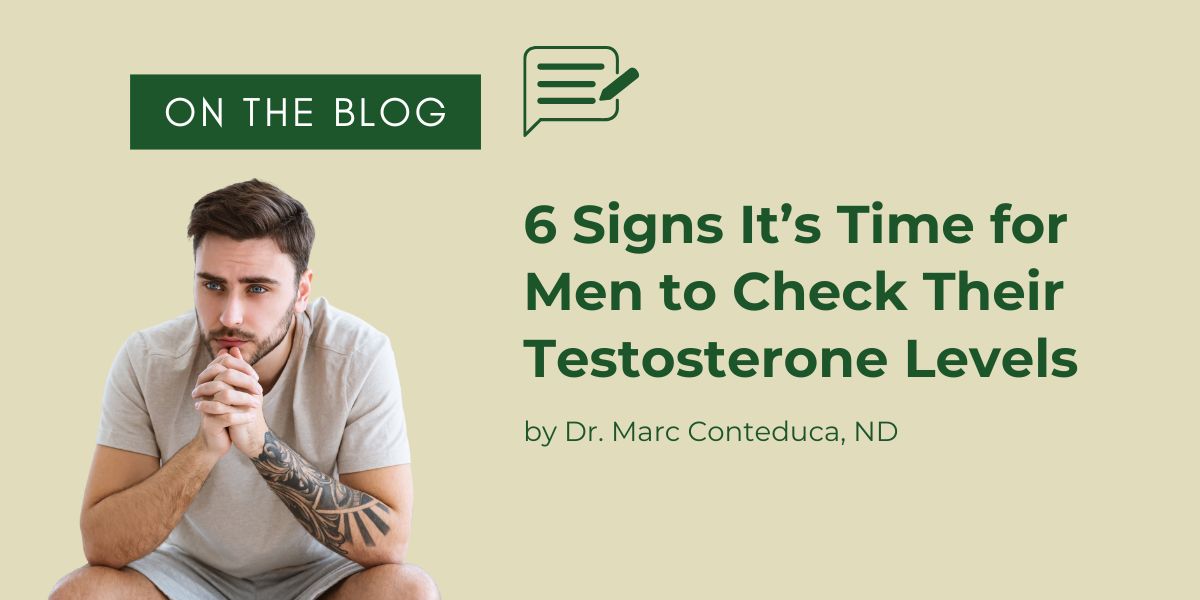
In the world of men’s health, testosterone often takes center stage—and for good reason. This essential hormone plays a key role in maintaining muscle mass, bone density, energy, mood, and even cognitive sharpness. Yet, many men don’t think about checking their testosterone levels until something feels “off.”
Knowing when to test can make a big difference—not just for addressing problems, but for taking proactive control of long-term vitality.
Understanding Testosterone and Its Role
Testosterone is produced mainly in the testes and is regulated by the brain’s hypothalamus and pituitary gland. It peaks in early adulthood and gradually declines—typically about 1% per year after age 30. While that decline is natural, lifestyle factors such as stress, poor sleep, excess body fat, and alcohol use can accelerate it.
Healthy testosterone levels support:
- Steady energy and motivation
- Lean muscle and fat balance
- Sexual health and libido
- Mental clarity and positive mood
- Bone strength and cardiovascular function
Signs It May Be Time to Get Tested
You don’t need to wait for major issues before considering a testosterone test. Testing can be part of a proactive wellness checkup, but here are specific signs that warrant a closer look:
1. Persistent Fatigue and Low Energy
If you’re sleeping well but still feel sluggish, testosterone deficiency might be a factor. Low levels can reduce red blood cell production and metabolism, contributing to exhaustion.
2. Mood Changes and Low Motivation
Irritability, sadness, or a general loss of motivation can stem from hormonal imbalance. Testosterone helps regulate neurotransmitters like dopamine and serotonin, which influence mood and focus.
3. Decreased Muscle Mass or Strength
Despite regular workouts, if you’re losing muscle tone or finding it hard to build strength, low testosterone could be limiting recovery and protein synthesis.
4. Increased Body Fat or Belly Weight
Hormonal imbalances can shift how your body stores fat, especially around the abdomen.
5. Reduced Libido or Sexual Performance
A drop in desire or performance can be one of the earliest signs of testosterone changes—but it’s also multifactorial, involving stress, sleep, and mental health.
6. Cognitive or Concentration Issues
Brain fog and difficulty focusing may accompany declining testosterone, especially when combined with stress or poor sleep.
The Best Time to Test
- Morning Testing (7–10 a.m.): Testosterone peaks in the early morning, so this is when blood tests are most accurate.
- Fasting if Possible: Some practitioners recommend fasting to minimize variables that can affect hormone readings.
- Repeat Testing: If results are borderline, a repeat test 2–3 weeks later can confirm trends.
Men over 40—or younger men with symptoms—should consider checking testosterone as part of an annual wellness screening.
Supporting Healthy Testosterone Naturally
Testing is just one part of a holistic approach. Before jumping to replacement therapy, it’s worth addressing lifestyle foundations that strongly influence hormone health:
1. Nutrition – Prioritize whole foods rich in zinc, magnesium, vitamin D, and healthy fats.
2. Exercise – Strength training and interval workouts stimulate natural testosterone production.
3. Sleep – Aim for 7–9 hours; deep sleep stages are when testosterone is replenished.
4. Stress Management – Chronic stress and high cortisol suppress testosterone production. Work on managing your stress by seeking support through counselling, or adding mindfulness practices such as deep breathing or meditation to your daily routine.
5. Weight Balance – Reducing excess body fat, especially around the waist, can improve hormonal balance.
6. Alcohol & Toxins – Limit alcohol and exposure to endocrine disruptors (like BPA and phthalates).
When to See a Professional
If your symptoms are affecting quality of life—or your tests confirm low testosterone—consult a qualified healthcare provider such as a naturopathic doctor. They can help identify underlying causes (such as thyroid or pituitary issues) and tailor treatment, which may include lifestyle adjustments or, in some cases, medical therapy.
The Takeaway
Testing testosterone isn’t just for men with obvious symptoms—it’s a valuable tool for proactive wellness. Understanding your hormone levels helps you make informed decisions about your health today and set the stage for energy, strength, and clarity well into the future.
Book your complimentary Discovery Call or Initial Naturopathic Consultation with Dr. Marc Conteduca today!
References
1. Harman SM et al. J Clin Endocrinol Metab. 2001;86(2):724-731.
2. Bhasin S et al. J Clin Endocrinol Metab. 2018;103(5):1715-1744.
3. Zarrouf FA et al. J Psychiatr Pract. 2009;15(4):289-305.
4. Snyder PJ et al. J Clin Endocrinol Metab. 2000;85(8):2670-2677.
5. Grossmann M. Clin Endocrinol (Oxf). 2011;75(5):575-581.
6. Corona G et al. J Sex Med. 2013;10(1):82-95.
7. Cherrier MM et al. Neurology. 2001;57(1):80-88.
8. Morgentaler A et al. J Clin Endocrinol Metab. 2022;107(8):2312-2336.
9. Pilz S et al. Horm Metab Res. 2011;43(3):223-225.
10. Kraemer WJ & Ratamess NA. Sports Med. 2005;35(4):339-361.
Book your discovery call with Dr. Marc today!
Dr. Marc Conteduca, ND
Sage Naturopathic Clinic